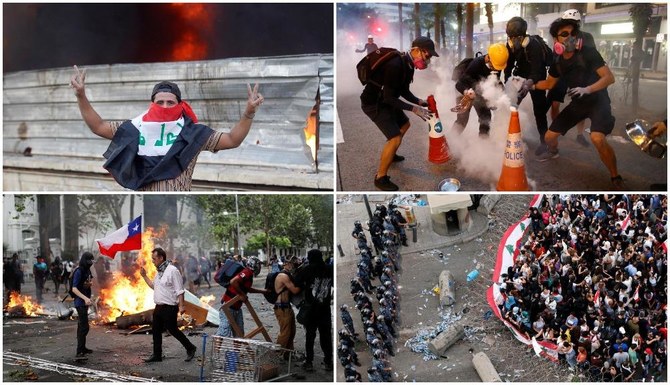LONDON: At least 47 of the world’s 195 countries witnessed a rise in unrest and violence in 2019 with the figure expected to rise in 2020, according to a study released earlier this week.
Verisk Maplecroft, a socio-economic and political analysis company, said in its index of global civil unrest that a quarter of the world’s nations were affected and that the number could hit 75 in the year ahead.
The UK-based consultancy firm identified Sudan as the most troubled and “extreme risk” country in the world, which had previously been held by Yemen.
According to the report, 2019’s biggest flashpoint locations were Hong Kong and Chile and neither is expected to be “at peace” for at least two years its researchers claim.
“The reasons for the surge in violent unrest are complex and diverse. In Hong Kong, protests erupted in June 2019 over a proposed bill that would have allowed the extradition of criminal suspects to mainland China, However, the root cause of discontent has been the rollback of civil and political rights since 1997,” the firm said. “In Chile, protests have been driven by income inequality and high living costs but were triggered by a seemingly trivial 30-peso (USD0.04) increase in the price of metro tickets,” it added.
Other countries now considered hotbeds unrest include Lebanon, Nigeria, and Bolivia. Asia and Africa are disproportionately represented with countries such as Ethiopia, India, Pakistan, and Zimbabwe also coming under the “extreme risk” label.
Since authoritarian leader Omar Al-Bashir was overthrown in April, Sudan was gripped by protests, violence, and killings as armed forces battled democracy supporters for control of the new government.
The index predicts that a further 28 countries examined will see a “deterioration instability,” suggesting that nearly 40% of all countries will witness disruption and unrest at some point in 2020.
Ukraine, Guinea Bissau, and Tajikistan are all expected to see the sharpest rises in unrest, but the report highlights a growing concern in the world’s biggest and most powerful countries as well.
Countries identified include the hugely influential nations of Russia, China, Turkey, Brazil, and Thailand.
Maplecroft says there will be increased pressure on global firms to exercise corporate responsibility, especially those in countries “rich in natural resources where mining and energy projects often need high levels of protection.”
“However, companies are at substantial danger of complicity if they employ state or private security forces that perpetrate violations,” the report added.
(with inputs from Agencies)









Comment